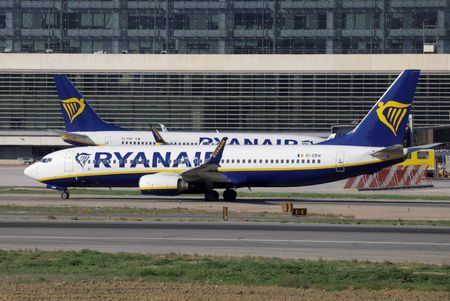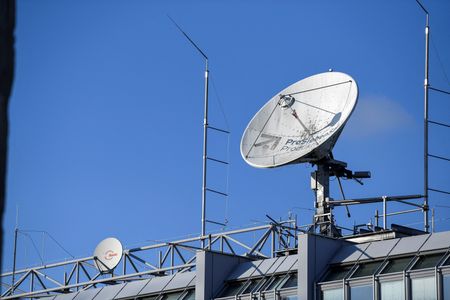By Kate Abnett and Joanna Plucinska
BRUSSELS/LONDON (Reuters) -Ryanair’s CEO said on Wednesday he was impressed by the turnaround at Boeing and had been reassured by the planemaker that it would seek approval to boost its monthly output of 737 jets to 42 per month from 38 by October.
The Irish airline, Europe’s largest by passenger numbers, has had to repeatedly cut growth forecasts due to delays by Boeing, which is working to stabilise production after a mid-air panel blowout on a new 737 MAX in January 2024 exposed widespread production quality and safety problems.
“The quality of what they’re delivering is excellent so we’re really impressed,” Ryanair’s Michael O’Leary told reporters in London, adding that he had spoken to Boeing’s commercial airplanes head Stephanie Pope earlier on Wednesday.
Ryanair has placed a firm order for 150 of the new, larger 737 MAX 10 jets as well, with O’Leary reiterating that Boeing had told him that certification of the plane was expected early next year.
He went on to tell Reuters in an interview that he was “optimistic, but not confident” of the timing of its next major delivery from Boeing, which consists of MAX 10 jets due in early 2027, and warned the airline’s growth could flatline that year if there was a delay.
“We’re getting very tight to our first deliveries, which is the spring of ’27, so optimistic would be more the word I’d use than confident,” O’Leary said in the interview.
“If we don’t get them in time for summer ’27, we will flatline in terms of growth for summer ’27 like, there’s not a lot I can do,” he added.
CHRISTMAS CAPACITY
O’Leary added that Ryanair had agreed with Boeing to bring forward the delivery of 25 new MAX 8 aircraft to October.
The Christmas travel season offers lucrative earning potential for carriers so maximizing capacity at that time can help meet higher travel demand. Ryanair said Boeing recently agreed to deliver the aircraft by October rather than by early 2026.
“We’ll put on extra flights from about the 15th of December through to about fifth or sixth of January, so there’ll be a reasonable spike in December and January, that peak high yielding traffic period Christmas,” O’Leary told journalists.
O’Leary said part of the reason for wanting to bring the MAX 8 deliveries forward was due to the risk of EU tariffs on U.S. jets.
“Right at the moment, we look like we’re getting away with no impact of tariffs. But, you know, I would still continue to be wary, I think certainly until the (U.S.) midterm elections at the back end of next year,” he said.
STRONG SUMMER
O’Leary said bookings remain strong and its financial guidance was unchanged from mid-August – when bookings were about 1% ahead of the same point last year – despite having to cancel around 700 flights in July due to strikes, mainly in France.
Ticket prices dropped 7% on average in Ryanair’s July-September quarter last year, which hit profits. O’Leary confirmed fares were expected to recover this year – but the extent of the rise would depend on last-minute bookings for September.
“We expect to get most of last year’s 7% decline, but not all,” he told reporters. He added that average fares across the summer so far were up by around 5-6%.
(Reporting by Kate Abnett and Joanna Plucinska. Writing by Conor Humphries. Editing by Louise Heavens, Elaine Hardcastle and Mark Potter)











